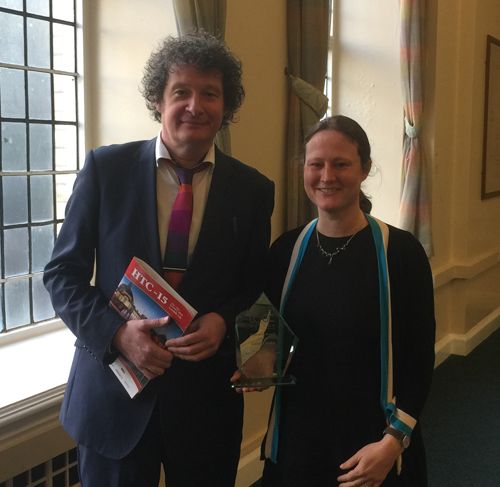Carolin Huhn Receives Inaugural 2018 LCGC Europe/HTC Innovation Award
Carolin Huhn was awarded the inaugural 2018 LCGC Europe/HTC Innovation Award on 25 January 2018 at 15th International Symposium on Hyphenated Techniques in Chromatography (HTC-15) in Cardiff, UK.
Photo Credit: Alasdair Matheson

Carolin Huhn was awarded the inaugural 2018 LCGC Europe/HTC Innovation Award on 25 January 2018 at 15th International Symposium on Hyphenated Techniques in Chromatography (HTC-15) in Cardiff, UK. The award was launched to celebrate “innovative achievements in hyphenated techniques that benefit society” and was selected by a judging panel from the HTC organizing committee.
Carolin Huhn is full professor of chemistry at the Eberhard Karls Universität Tübingen, and is also the spokeswoman of the Platform Environmental System Analysis in the Excellence Initiative at the university.
Huhn’s research emphasizes a modular instrumental approach where the modular building blocks can be flexibly combined in relation to particular analytical tasks to implement a broad range of different elements of chemical analysis, such as matrix separation, analyte preconcentration, separation, and identification. A large part of her research is related to design, optimization, and characterization of intelligent interfaces between the modules.
The judging panel was very impressed with Huhn’s work. “The high flexibility of the building block system proposed by Carolin and the deep knowledge of the basic effects,” the panel commented, “which are involved in all fields of separation science are emphasized by the fact that they can be used to analyze very small organic molecules as well as very large biomolecules, such as intact proteins.”
One aspect of Carolin’s work that the judges found particularly innovative was her work on one-dimensional and multidimensional electrophoretic separation techniques, in particular the development of novel coupling interfaces and sensitive detection techniques, both for intermediate detection and final quantitation and identification.
Alasdair Matheson, editor-in-chief of LCGC Europe, commented that the publication is proud to support the community through this award. “LCGC Europe focuses on providing the chromatography community with practical information that helps them do their jobs more effectively and increase knowledge,” he said. “We are proud to work with the HTC-15 organizers to celebrate the work of a scientist who is innovatively evolving separation science to benefit society.”
Common Challenges in Nitrosamine Analysis: An LCGC International Peer Exchange
April 15th 2025A recent roundtable discussion featuring Aloka Srinivasan of Raaha, Mayank Bhanti of the United States Pharmacopeia (USP), and Amber Burch of Purisys discussed the challenges surrounding nitrosamine analysis in pharmaceuticals.
Extracting Estrogenic Hormones Using Rotating Disk and Modified Clays
April 14th 2025University of Caldas and University of Chile researchers extracted estrogenic hormones from wastewater samples using rotating disk sorption extraction. After extraction, the concentrated analytes were measured using liquid chromatography coupled with photodiode array detection (HPLC-PDA).





